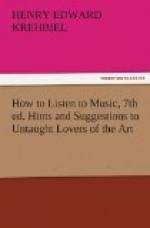[Sidenote: Beethoven as a pianist.]
The period of C.P.E. Bach, Haydn, and Mozart is that in which the pianoforte gradually replaced its predecessors, and the first real pianist was Mozart’s contemporary and rival, Muzio Clementi. His chief significance lies in his influence as a technician, for he opened the way to the modern style of play with its greater sonority and capacity for expression. Under him passage playing became an entirely new thing; deftness, lightness, and fluency were replaced by stupendous virtuosoship, which rested, nevertheless, on a full and solid tone. He is said to have been able to trill in octaves with one hand. He was necessary for the adequate interpretation of Beethoven, whose music is likely to be best understood by those who know that he, too, was a superb pianoforte player, fully up to the requirements which his last sonatas make upon technical skill as well as intellectual and emotional gifts.
[Sidenote: Beethoven’s technique.]
[Sidenote: Expression supreme.]
Czerny, who was a pupil of Beethoven, has preserved a fuller account of that great composer’s art as a player than we have of any of his predecessors. He describes his technique as tremendous, better than that of any virtuoso of his day. He was remarkably deft in connecting the full chords, in which he delighted, without the use of the pedal. His manner at the instrument was composed and quiet. He sat erect, without movement of the upper body, and only when his deafness compelled him to do so, in order to hear his own music, did he contract a habit of leaning forward. With an evident appreciation of the necessities of old-time music he had a great admiration for clean fingering, especially in fugue playing, and he objected to the use of Cramer’s studies in the instruction of his nephew by Czerny because they led to what he called a “sticky” style of play, and failed to bring out crisp staccatos and a light touch. But it was upon expression that he insisted most of all when he taught.
[Sidenote: Music and emotion.]
More than anyone else it was Beethoven who brought music back to the purpose which it had in its first rude state, when it sprang unvolitionally from the heart and lips of primitive man. It became again a vehicle for the feelings. As such it was accepted by the romantic composers to whom he belongs as father, seer, and prophet, quite as intimately as he belongs to the classicists by reason of his adherence to form as an essential in music. To his contemporaries he appears as an image-breaker, but to the clearer vision of to-day he stands an unshakable barrier to lawless iconoclasm. Says Sir George Grove, quoting Mr. Edward Dannreuther, in the passages within the inverted commas:
[Sidenote: Beethoven a Romanticist.]




